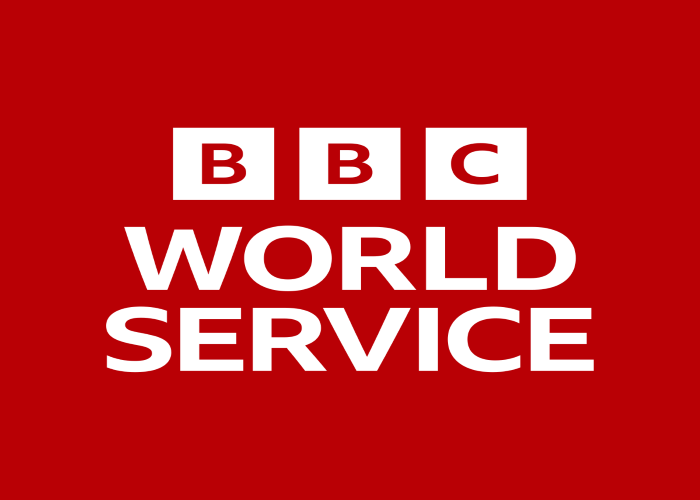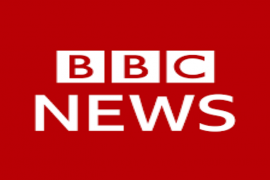Throughout the four days of BBC coverage of Operation Breaking Dawn a marked difference was evident between content broadcast on the BBC’s domestic station Radio 4 and that aired on BBC World Service radio.
During those four days (August 5th to 8th inclusive), listeners to BBC Radio 4 heard generally reasonable reports provided exclusively by the BBC Jerusalem bureau’s Yolande Knell.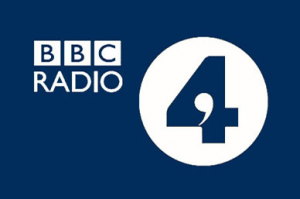
Friday, August 5th:
‘The World Tonight’, presenter Julian Worricker, from 01:18 and 15:33 here
Report by Yolande Knell
Saturday, August 6th:
‘Today’, presenter Mishal Husain, from 11:30 and 1:04:16 here
Reports by Yolande Knell
Sunday, August 7th:
‘Broadcasting House’, presenter Paddy O’Connell, from 03:56 here
Report by Yolande Knell
Sunday, August 8th:
‘Today’, presenter Martha Kearney, from 37:02 and 2:02:36 here
Reports by Yolande Knell
‘World at One’, presenter Jonny Dymond, from 03:18 and 30:50 here
Reports by Yolande Knell
‘Six O’Clock News’ from 10:57 here
Report by Yolande Knell, including recording of Hossam Elsharkawi (regional director Red Cross/Crescent)
Knell also contributed to programmes aired on BBC World Service radio on the same days but in most of those broadcasts, listeners around the world also heard additional commentary.
Friday, August 5th:
‘Newshour’ (evening edition), presenter Julian Marshall, from 14:05 here
Report by Yolande Knell
‘Global News Podcast’, presenter Alex Ritson, from 01:16 here
Report by Yolande Knell
Saturday, August 6th: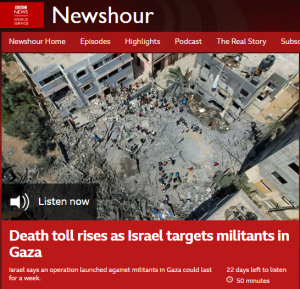
‘Newshour’ (afternoon edition), presenter Julian Marshall, from 00:12 here
Recordings: Yair Lapid (Israeli prime minister), Gaza resident, Ashkelon resident
Report by Yolande Knell
Interviews: Ghazi Hamad (Hamas), Galit Baram (Israel foreign ministry)
‘Newshour’ (evening edition), presenter Julian Marshall, from 00:12 here
Recordings: Benny Gantz (Israeli minister of defence), Gaza resident, Ashkelon resident
Report by Yolande Knell
Interviews: Ghazi Hamad (Hamas), Galit Baram (Israel foreign ministry)
Sunday, August 7th:
‘Global News Podcast’, presenter Jackie Leonard, from 07:29 here
Report by Yolande Knell, recordings Gaza resident, Ashkelon resident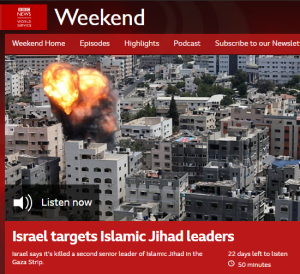
‘Weekend’, presenter Paul Henley from 00:11 and 10:55 here
Recording: Benny Gantz,
Interviews: Basem Naim (Hamas head of politics and foreign relations), Noga Tarnopolski (Israeli journalist)
‘Weekend’ (second hour), presenter Paul Henley, from 00:57 here
Recording: Benny Gantz
Interview: Basem Naim (Hamas)
Report by Yolande Knell
‘The World This Weekend’, presenter James Naughtie, from 02:09 here
Report by Yolande Knell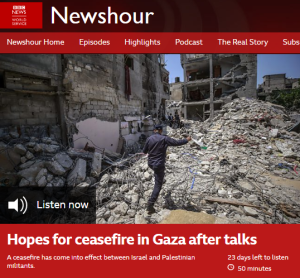
‘Newshour’ (afternoon edition), presenter James Coomarasamy, from 00:09 and 44:02 here
Recordings: Dr Mohammed Abu Selmia (director Shifa hospital in Gaza), spokesman Palestinian Islamic Jihad, Benny Gantz
Reports by Yolande Knell
Interview: Husam Zomlot (discussed here)
‘Newshour’ (evening edition), presenter James Coomarasamy, from 00:09 here
Report by Yolande Knell
Interview: Dr Medhat Abbas (director general ministry of health Gaza Strip)
Sunday, August 8th:
‘Newsday’, presenter Sana Safi, from 06:24 here
Interviews: Aya al Ghazzawi (discussed here), Mannie Fabian (Israeli journalist)
‘Newshour’ presenter Razia Iqbal from 14:05 here
Report by Yolande Knell
Recording: Dr Medhat Abbas (director general ministry of health Gaza Strip)
Interview: Tzipi Hotovely (Israeli ambassador to the UK)
‘BBC OS’, presenter James Reynolds from 18:04 here
Recordings: Tzipi Hotovely (clip from the above), Husam Zomlot (clip from the above), Hossam Elsharkawi (regional director Red Cross/Crescent), South African minister Naledi Pandor
In all, over those four days of coverage listeners heard from two Israeli journalists, from an Israeli foreign ministry spokesperson on two occasions and from the Israeli ambassador to the UK (partly repeated in a later programme). A recording of Israel’s prime minister speaking appeared in one programme and a recording of remarks from Israel’s minister of defence was used on four occasions.
In contrast, listeners heard from two representatives of the Hamas terrorist organisation on two occasions each, from the director of the Hamas-run Gaza health ministry on two occasions, from the director of the Hamas-run Shifa hospital, from a political activist in the Gaza Strip, from the Palestinian Islamic Jihad terrorist organisation spokesman and from the PA representative in London (partly repeated in a later programme).
The fact that Hamas imposed restrictions on journalists in the Gaza Strip, which included a ban on reporting of shortfall missiles, clearly did not perturb the BBC World Service from soliciting interviews with representatives of that terrorist organisation and providing a worldwide platform for its talking points.
BBC editorial guidelines state:
“11.2.6 Any proposal to approach an organisation (or an individual member of an organisation) designated a ‘terrorist group’ by the Home Secretary under the Terrorism Acts, and any proposal to approach individuals or organisations responsible for acts of terror, to participate in our output must be referred in advance to Director Editorial Policy and Standards.”
Both Hamas and the PIJ are designated by the UK Home Secretary and it would therefore appear that those interviews with members of Hamas were approved by David Jordan in advance, despite their minimal contribution to audience understanding of the story and notwithstanding Hamas’ blatant disregard for press freedom.
Related Articles:
CONTEXT OMITTED FROM BBC RADIO REPORTING ON DEATH OF GAZA CHILD

